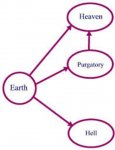Here's my take on how this conversation is going.
Catholic person states a premise. They use quotes, history, logic, facts to back up said premise. They then ask questions to establish where we stand.
Protestant responds, nu uh. That's not true because I said so. They proceed to not answer said questions or give any substantial reason as to why they disagree with Catholic viewpoint. I can honestly say that I have no idea what most of you guys actually believe. Does anyone here have the courage to name your denomination so that I can attempt to educate myself on what Bible you read and what you believe in?
Catholic person states a premise. They use quotes, history, logic, facts to back up said premise. They then ask questions to establish where we stand.
Protestant responds, nu uh. That's not true because I said so. They proceed to not answer said questions or give any substantial reason as to why they disagree with Catholic viewpoint. I can honestly say that I have no idea what most of you guys actually believe. Does anyone here have the courage to name your denomination so that I can attempt to educate myself on what Bible you read and what you believe in?
Christians who are Christians according to the biblical definition rely on the bible not a host of secular documents.
I use an English translation based on the 1611 King James. I do not have any issues with similar versions like the NIV as most are true to the original manuscripts. I am OK with the Catholic Douay-Rheims bible.
Now tell me if you have assurance of your salvation. If you died today would you be in heaven with Jesus? Scripture says that those who are saved should be able to give a reason for the hope that lies within them.
1Pe 3:15 But sanctify the Lord God in your hearts: and be ready always to give an answer to every man that asketh you a reason of the hope that is in you with meekness and fear:
For the cause of Christ
Roger

